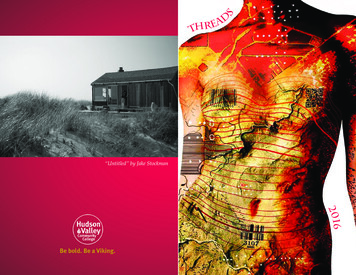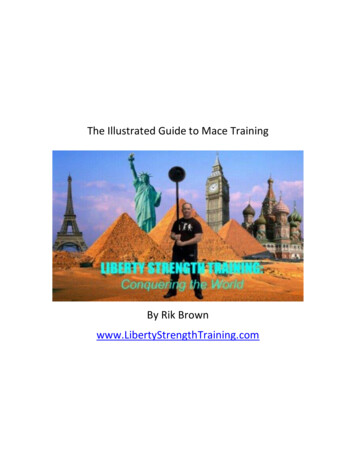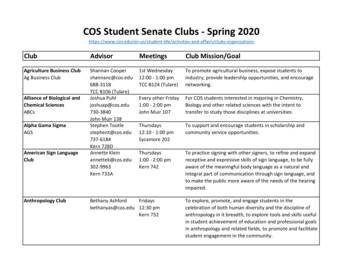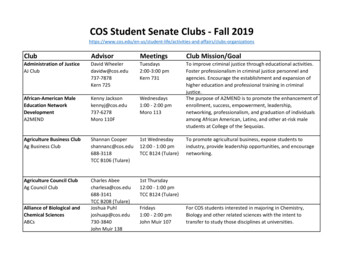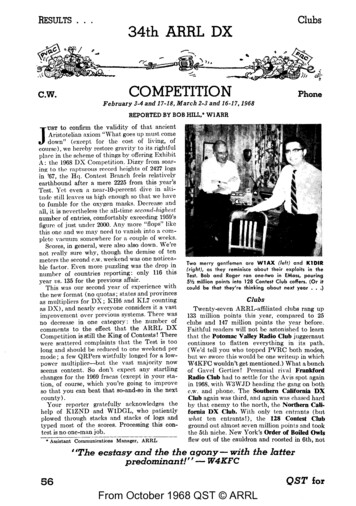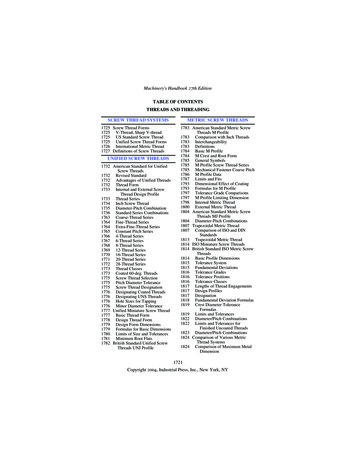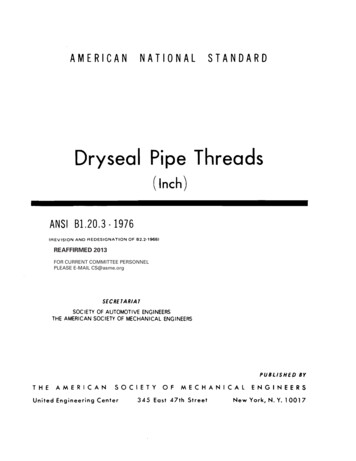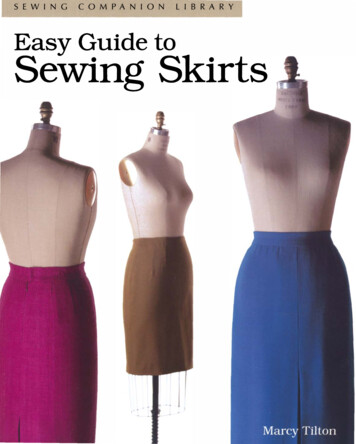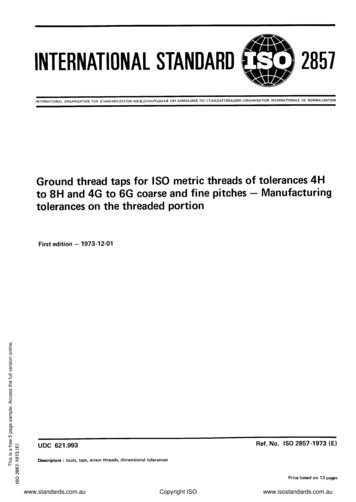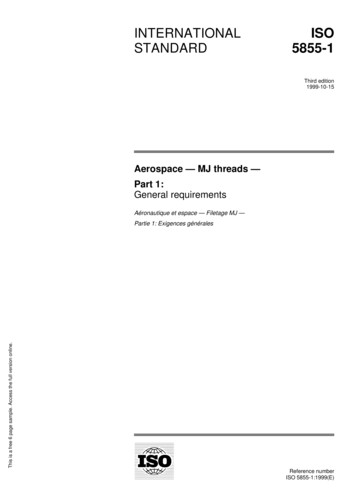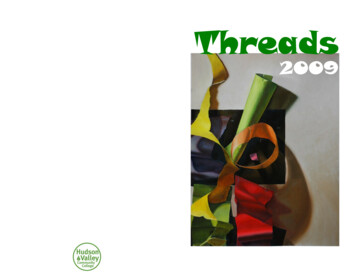
Transcription
Threads20091001
Threads is a journal of student writing and art published byThe English, Modern Languages, and ESL Department atHudson Valley Community CollegeTroy, New YorkView of Tampa from Apollo BeachBy: Sarah BurgerThe crisp salt and sand.Little gulls stay and away.Indecisive sky .By: Christopher Gregory2009 EditorsMary EvansMegeen MulhollandEthan RoySara TedescoSunsetAll rights to reproduction by any meansrevert to the writer upon publication.Special Thanks to:Maria Palmara, Department ChairThe Graphics DepartmentThe Print ShopMcGraw-Hill Companies, Inc.299
Message from the EditorsSummer Wild FlowersBy: Sarah BurgerWe would like to thank all the students who submittedtheir work to Threads this year. We received many qualitysubmissions, and we continue to read with pleasure theenthusiasm and creativity each submission presents. Whilereviewing student work, we were often moved to laughterand tears, and this year in particular contains many piecesof personal reflection. Of course, all pieces have merit, andwe would like to publish everything submitted, but the limitations of space will simply not allow it.It is important to note that Threads reflects works that arenot necessarily perfect in their format and composition, butexhibit insight, creativity, social awareness, and a uniqueperspective. The personal essays and the creative pieces—poetry, fiction, and photography—reflect the range ofexperience, culture, and imagination of the Hudson ValleyCommunity College student. The editors relish theopportunity to travel to and explore the territory each newissue stakes out.Every year we are extremely pleased to highlight the exceptional work of the students at Hudson Valley CommunityCollege. Please plan your submission for next year.Please submit your work to Threads electronically.Visit us at http://threads.hvcc.edu or email your work tothreads@hvcc.edu983
Table of Contentspeaceful resolution in his identity search that preserves his parents’heritage and his life in America.TITLEAUTHORPAGEStill Life 1India:Upon Regarding a Temple at DawnHamlet’s Hawk: A VillanelleFriendshipA Loss of InhibitionsSumming Up Zinsser’s “Simplicity”Robert Frost Picture PoemSaying No to Happiness:A Character Analysis of “Eveline”What Does It Mean to Be Black?First Time Voter Heading to the PollsDreamingAnother Storm: A SestinaI Wasn’t ChrisLike Father, Like DaughterThe D-DayMy ShadowThe Doer and the ThinkerA Life CoachThe IncidentThe SpillWhat Writing Means to MeDetails, DetailsJust the WindWhistlerSecret RomanceIndulging YourselfSymbolismMy Hell Is a Place on EarthChiefFake ControlUntitledFlagellationOppositeEternal BlissHanti Liucover4Samaria CorralesJillian K. PuglieseAllison SmithTara KnableAmanda BarnettEden Brand678101314Lindsey HathawayM-shamean WalleyLynda JarvisChristopher GregorySamaria CorralesChristopher HotoppBeth HazeltonHanti LiuMartin DitmarsTom HowleyKaren McGuigganPaula HoppingSamaria CorralesNora SalemHannah BewsherKen TowneEthan NielsenKaren McGuigganHunter ShareAndrew BoyeaAaron SylvesterGregory Harbin LintonMichelle WangSyreeta NurseKerri SchultzChristopher GregoryMichelle 585961636667Works CitedEngles, Tim. “Lee's 'Persimmons.’ ” Explicator 54, no. 3 (spring 1996). LiteratureResource Center. Web. 17 February 2009.Li-Young Lee. Literature Resource Center. Web. 17 February 2009.97
Lee describes a scene in which Mrs. Walker brings in a Chineseapple for the American children to taste. Engles refers to the crosscultural tension found in the following scene.The scene expands into the image of an Asian American childwho declined the offered fruit because he knew “it wasn't ripe orsweet,” and “watched the other face.” Unripe persimmons are extremely sour and astringent, and Lee has sketched in enough of the scene tosuggest those childish faces scrunching up and turning to the quiet Chinese boy who eats such strange terrible food at home.At this point, midway through the poem, Lee's tone changes toone of sweet memories of his parents and the deep connections to themfound in persimmons. He describes the warmth of the persimmon byusing his mother's words golden and glowing. A scene is recounted oftwo persimmons found in a cellar that the author kept in his room waiting for them to ripen. Another experience surfaces of Lee's father, whilegoing blind, is given a persimmon that perfectly personifies the bittersweet feelings of the evening.The poem closes with a final recent memory of the speaker describing to his blind father a scroll found of a painting of two persimmons. His father's words of reply centering on the eternal memory ofprecision surrounding the permission enhance the cultural theme ofLee's poem: Some things never leave a person: “scent of the hair of oneyou love,/ the texture of persimmons, / in your palm, the ripe weight.”In the final embracing of the persimmon, Lee symbolizes his desire tohold on to the fading threads of his Chinese heritage amidst his unionwith American culture.In conclusion, Li-Young Lee's poem “Persimmons” forces itsreaders to question the validity of America's reputation as a place offreedom from all racism and oppression. If this young Chinese boyfound so much difficulty in his American classroom in Pennsylvania,how can America really live up to this reputation as he ages? As thepoem continues, Lee makes it clear that this difficulty in being toleratedin another culture was not simply one experience, but rather a lifetimeof internal controversy, only increased by external racism, between twoextremely different world views. Thankfully, Lee is able to come to a96Table of ContentsTITLEAUTHORThe ForestThe EdgeMetal Head AlysFocusStill Life 2Asking Cella to Marry Me!Pain Is Like a FlowerA Villanelle about BacteriaMorning Showermemories are perfume for the eyesCan We Go On?Losing FaithFade to LightAnalyzing Li-Young Lee’s“Persimmons”Summer WildflowersSunsetView of Tampa from Apollo BeachChris LewisMeegan TaddonioRomey J. RomanoChristopher GregoryHanti LiuRomey J. RomanoTyler HaberkernStephanie RossSarah BurgerEdward RinaldiBarbara HoenzschMegan AureliaAdam West70717576777882858687889294Lindsey HathawaySarah BurgerChristopher GregorySarah Burger959899995PAGE
THREADS WRITING AWARDS WINNERAnalyzing Li-Young Lee’s “Persimmons”By: Lindsey HathawayIndia: Upon Regarding a Temple at DawnBy: Samaria CorralesCurry, curry, currygold, gems, glitzflip flops, sandalwood, Bollywooddirty water, coursing through the gutters,sewage seeping into the cobblestone streets.Beggars and their stench thatcongests the already crowded air.Rats nibble crumbles and crawl overemaciated children with outstretched hands.Oils seeping from the hairlinesunder shade that does not stopthe heat.6Li-Young Lee's “Persimmons” develops the theme of the difficulty of integrating into a society other than the one which he grew upin. Li-Young Lee was born in Jakeartara, Indonesia, in 1957. His childhood began with much uneasiness as his father served as a personalphysician to Mao Tsetung. Mae Tsetung, a prominent communist inline for presidency in China, had very different views than Lee's father,Kuo Yaun. Kuo Yaun was a Christian and a Nationalist in China'sprominently communist society. The family emigrated to Indonesia,where Kuo Yaun taught at a Christian institute, until he was arrested in1958. Following the arrest and 19 months of incarceration the familymoved from Hong Kong to Macao to Japan, and finally to the U.S. In1964. Settling in western Pennsylvanian, the family seemed to meetonly racism and disrespect. It is in this place that Lee's poem Persimmons seems to be set in (Almon.)“Persimmons” begins with a scene in which the speaker, LiYoung is being punished in a sixth grade classroom for mispronouncing the word precision. “In the sixth grade Mrs. Walker/ slapped theback of my head/ and made me stand in the corner/ for not knowing thedifference/ between persimmon and precision.” Lee paints that histeacher, Mrs. Walker, as extremely insensitive and uncaring about hisintegrating into an American classroom. He builds on this theme as hedescribes to the reader the pleasure he has in eating persimmons, fruitssimilar to apples and popular in Asia, peeled and cut in perfection.The next stanza describes a sensual scene between the authorand his white wife, Donna. In attempting to teach her Chinese, the author realizes that having assimilated himself into American culture, hehas forgotten many words from his home country. The poet says, “Iteach her Chinese./ Crickets: chiu chiu. Dew: I've forgotten./ Naked: I'veforgotten.” Tim Engles, a literary critic, suggests that this scene withDonna symbolizes Lee's growing detachment with his parents and theircultural heritage, as well as his growing attraction to life in America.Allowing another flashback into his childhood, Lee, focuses onother words that he found difficulty in pronouncing after his immigration to America, describing the meaning of each word in his life.95
Fade to LightTHREADS WRITING AWARDS WINNERBy: Adam WestHamlet's Hawk: A VillanelleThe moon was hungryThe sun had turned grayThe wolf came out of his den and howled away.The rabbits were sleepingChirping birds made no soundNot a speck or an instance of light could be foundNight watchers were gazingBig cats on the prowlLittle creatures snatched up by ravenous fowlExcitement was comingDawn showing her faceA glow under the mountain lit up the whole placeA young fawn was bouncingBirds floated at seaA willow tree said good morning while waving at meBy: Jillian K. PuglieseAlong the quay, alone I walkHours until I am homeboundSeductive waves coo 'neath the dockMiles away, the bell tower clockThreatens with alarming soundAlong the quay, alone I walkAbove me flies a murderous flockShrieking; all other noise is drownedSeductive waves coo 'neath the dockAmongst the birds, one sordid hawkThe antagonist, he was most surely crownedAlong the quay, alone I walkSplash and spray engulf the rocksBattering the groundSeductive waves coo 'neath the dockI'm paralyzed when my eyes lockOn an Ophelia floating by, a lifeless moundAlong the quay, alone I walkSeductive waves coo 'neath the dock947
THREADS WRITING AWARDS WINNERFriendshipBy: Allison SmithWith an open hand, I reach forward and press my palm into myhorses neck; her veins are thick with adrenaline and excitement, but soare mine, and our energy melts into one. My nerves start to settle aswe walk into the arena; still pressing my hand softly on her neck, shefeels my breath, and we exhale simultaneously. My mind, saturatedwith a flurry of details, begins a monotonous rhythmiccounting pattern.The in-gate of a show jumping arena, sitting comfortably atopmy well worn, faded saddle, is a familiar place for me. It is a home,where I matured and experienced a full range of emotions. Equestriansport symbolizes an art form encompassing the ultimate in trust andfriendship, reliance and loyalty, and a sport, done well, that requiresbalance, intelligence, and athleticism. Show jumping attracts dare devils and thrill seekers, little girls that dream of ponies, and aristocratssearching for royalty and grandeur, but in my case, the attraction istruly and unequivocally the horses.Before the whistle blows, I pause; we move a few steps backward, grounding my thoughts and gathering the over-stimulated mindof my partner. As we begin to canter, I soften my arms, decreasing therestrictive pressure of my reins, and my mare excitedly increases theanimation and athleticism of her gait. Her motivation and enthusiasmare evident to even the most inexperienced onlooker. The pattern ofthe jumps is vivid and clear in my mind. I often pretend that I amwatching a video of the future, visualizing every movement in mycourse. In observing my mare’s ears, pricked forward with certaintyand keen focus, I follow her lead; my attention now infallible. Mymind, like the focus feature on a camera, brings the first jump into myframe of vision. Carefully, I zoom in on the obstacle, blinking a fewtimes, readjusting, and calculating until the frame is crystal clear. Theenergetic youngster beneath me gathers her stride, like the coiling of aspring, increasing her potential energy. I shift my body weight slightlyto the back of my saddle, anticipating the surge of power at take off,eager to feel her front end explode upward with uninterrupted fluidityand power. My body reacts to the movement spontaneously; the8his face, and then I looked at my father. I was alone with him for thefirst time in weeks, but he didn’t say anything. He was too pale andthat’s when it hit me. He wouldn’t ever say anything to me again. I satdown on the chair and was instantly uncomfortable, so I stood back up.I took hold of my father’s hand and started talking. I cursed God andeveryone that got to live instead of him. I don’t think I noticed howloud my sobs got until my mom came in and steered me out withoutmuch trouble. I sank onto the floor as a nurse hurried by with a tray offood. Not my father’s food though.I don’t remember much past that day. The whole wake andfuneral is still blur. I couldn’t stand the priest who shook my hand. Hetalked of my father’s time and of God’s will. I wanted nothing to dowith it.I’m still not over my father’s death and probably will never be.I don’t go to church because I think it is a waste. I prayed and prayedand my father got worse and worse. What sort of a God would takeaway a girl’s right to have her father walk her down the aisle? I don’tdisregard other peoples’ belief in a religion or in a God; however, theevents in my life had led me to a place where maybe religion isn’t thebest thing to believe in. Hope is something to believe in, and so is love.Religion based solely in myth is not. Without the help of anyone’s GodI have made it through my father’s death and I am doing well in college. I hope to continue with college and be successful without the helpof a church.93
L
Visit us at http//threads.hvcc.edu or email your work to threads@hvcc.edu Z Table of Contents TITLE AUTHOR PAGE Still Life W Hanti Liu cover India ñ Upon Regarding a Temple at Dawn Samaria Corrales \ Hamlet’s Hawk ñ A Villanelle Jillian K. Pugliese ] Friendship Allison Smith A Loss of Inhibitions Tara Knable W V Summing Up Zinsser’s “Simplicity” Amanda Barnett W Y Robert Frost .
